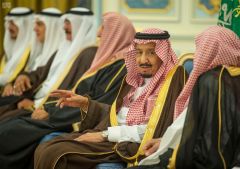
(CNSNews.com) – The U.S. Commission on International Religious Freedom on Monday acknowledged the Trump administration’s “high-level commitment” to advancing religious freedom, but expressed concern that egregious violators have little incentive to improve as long as sanctions against them are waived indefinitely.
In its newly-released annual report, covering 2018, the USCIRF examined the situations in 28 countries, offering recommendations to the executive and legislative branch on ways of prodding those countries to improve, using the provisions of U.S. law.
Since the release of the last USCIRF annual report, the administration last November designated Pakistan as a “country of particular concern” (CPC), a decision welcomed by the independent statutory watchdog, which had been calling for the step since 2002, to no avail.
The USCIRF said the administration has taken action on its commitments to prioritize religious freedom, citing the appointment of former Kansas Gov. Sam Brownback as ambassador-at-large for international religious freedom. Brownback had “energetically implemented his mandate,” it said.
It also pointed to State Department’s hosting of the first-ever Ministerial to Advance Religious Freedom, last July, and programs and initiatives that had emerged from that. A second is planned for this summer.
An issue that has troubled the USCIRF for years has been the way the executive branch has dealt with CPC designations.
Under the 1998 International Religious Freedom Act (IRFA), administrations are required to designate as CPCs countries that have engaged in or tolerated “systematic, ongoing, egregious violations of religious freedom.” The statute provides for sanctions or other measures designed to encourage improvement.
In its report, the commission noted that of the ten current CPCs, four are spared sanctions due to waivers citing the “important national interest of the United States.”
The four are Saudi Arabia, Turkmenistan, Tajikistan, and the recently-designated Pakistan.
The other six are subject to so-called “double-hatted sanctions” – in other words, they are already facing U.S. punitive measures for other reasons, but are deemed also to be sanctioned for their CPC status.
The report recalled that this has been the approach taken by successive administrations.
“[W]hile the statute permits it, USCIRF has long expressed concern that using preexisting sanctions or indefinite waivers provides little or no incentive for CPC-designated governments to reduce or halt egregious religious freedom violations,” it said.
The report called for the waivers on sanctions against Saudi Arabia, Turkmenistan, Tajikistan, and Pakistan to be lifted.
The IRFA established both the USCIRF and the ambassador-at-large post, and created the framework for pressing foreign governments to respect and protect religious freedom.
Reauthorization legislation in 2016 expanded the legislation, in a bid to make its implementation more effective.
Among other things, it limited sanctions waivers to 180 days, after which time the president is required to report to Congress that the foreign government concerned has stopped the violations, or that the “important national interest” waiver is required.
Saudi Arabia, long regarded by many advocates to be among the world’s worst violators of religious freedom, has been a CPC since 2004, and sanctions against it have been waived by the Bush, Obama and Trump administrations.
As recently as Friday, the USCIRF called again for the waiver to be lifted, citing the kingdom’s execution by beheading of 37 Saudis, mostly minority Shi’ites.
“The State Department must stop giving a free pass to the Saudi government, which, for many years, has punished numerous Saudi citizens and expatriate workers for exercising their fundamental right to freedom of religion or belief, “said USCIRF chairman Tenzin Dorjee.
‘Particularly severe violations’
In the annual report, the USCIRF noted some positive trends in Saudi Arabia in 2018, including that fact senior officials “no longer stated that Islam can be the only religion on the Arabian Peninsula.” Senior leaders had met with some Christian leaders, “pledging to promote interfaith dialogue and the flourishing of different faith traditions as part of the kingdom’s domestic reforms.”
But it also reported ongoing, serious problems.
The kingdom “maintained a ban on non-Muslim public religious observance and continued to arrest, detain, and harass individuals for dissent, blasphemy, and apostasy,” it said.
“The Saudi government continued to violate the rights of Shi’a Muslims and non-Muslim minorities, and to advocate a doctrine of religious intolerance.”
It also pointed to “religiously justified guardianship system” which it said continues to adversely affect the religious freedom of Saudi women, despite the lifting of a ban on women driving.
Citing “particularly severe violations of religious freedom,” the commission recommended that Saudi Arabia remain on the CPC list, and that the sanctions waiver be lifted.
(One USCIRF commissioner, Trump-appointee Johnnie Moore, posted an “individual” view, saying while he believes Saudi Arabia still merits CPC status, the State Department should maintain the waiver.
“I do not think the way of persuading Saudi Arabia to improve its religious environment is by shame and by force. I do think it is through direct, respectful and meaningful engagement, as I have personally experienced and am personally experiencing,” he wrote. Moore, who visited the kingdom in September and November, said, “I believe – for the first time – that religious freedom is possible in Saudi Arabia.”)
The ten current CPCs designated by the State Department are Burma, China, Eritrea, Iran, North Korea, Pakistan, Sudan, Saudi Arabia, Tajikistan, and Turkmenistan.
The USCIRF in its latest report concurred with the ten designations, but said another six countries meet the criteria for designation. It called on the State Department to add the Central African Republic, Nigeria, Russia, Syria, Uzbekistan, and Vietnam to the list.
Source material can be found at this site.









